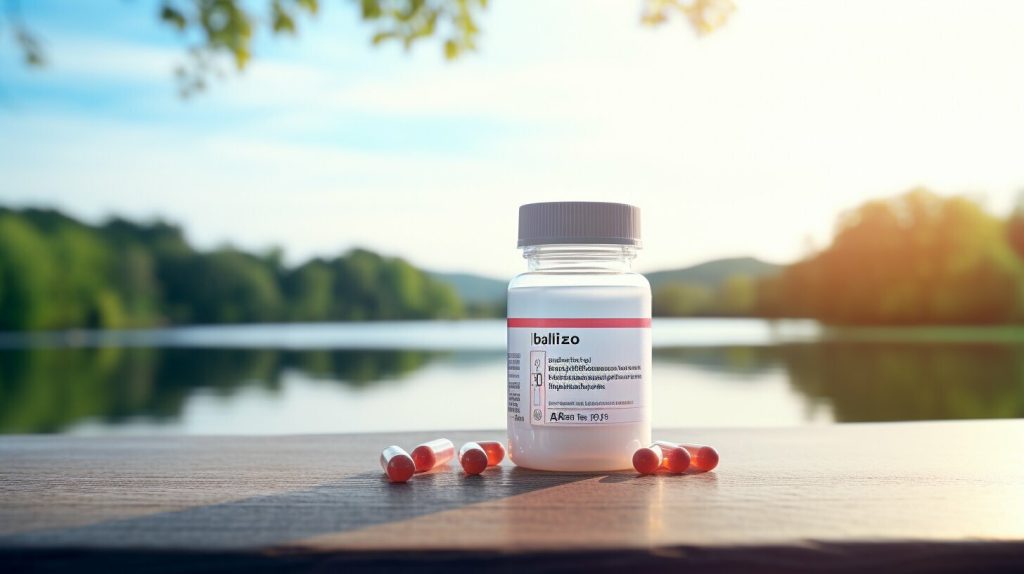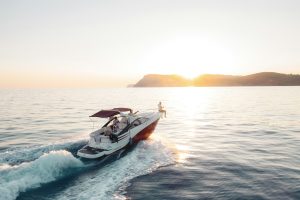Are you ready to set sail on a sea adventure? Don’t let seasickness dampen your spirits! In this guide, I’ll share my experiences and provide you with tips on how to prevent seasickness while sailing.
Key Takeaways
- Stay hydrated and avoid alcohol to minimize seasickness symptoms.
- Try incorporating ginger, either in the form of ginger ale or ginger candies, as a natural remedy to alleviate seasickness.
- Eat light and healthy foods before sailing to avoid exacerbating symptoms.
- Sit in the middle of the boat and focus on the horizon for stability and reduced motion sensation.
- Consider motion sickness medication, such as Dramamine or Bonine, for prevention or relief.
Seasickness is a common problem that can be experienced while sailing due to the motion of the boat on the waves. Symptoms such as dizziness, nausea, and fatigue can put a damper on your sailing experience. While it’s difficult to completely prevent seasickness, there are strategies that can help minimize its effects.
One of the first things to consider is staying hydrated and avoiding alcohol. Proper hydration is key to keeping your body functioning optimally, and alcohol can dehydrate you and worsen seasickness symptoms. Instead, opt for water and non-alcoholic beverages to stay refreshed during your time on the water.
Ginger has been found to be a natural remedy that can alleviate seasickness. Ginger can be consumed in various forms, such as ginger ale or ginger candies, and has properties that help soothe an upset stomach. Consider incorporating ginger into your sailing routine to see if it helps reduce seasickness symptoms.
When it comes to food, it’s best to eat light and healthy before setting sail. Heavy and greasy foods can exacerbate seasickness, so opt for meals that are easy to digest and provide the necessary nutrients to keep you energized during your sailing adventure.
Positioning yourself in the middle of the boat and focusing on the horizon can also help provide stability and reduce the feeling of motion. By keeping your gaze fixed on a stable point, your brain can better adjust to the boat’s movements, minimizing the chances of experiencing seasickness.
If natural remedies and preventive measures aren’t enough, motion sickness medication can be considered. Medications such as Dramamine or Bonine are commonly used to prevent or alleviate seasickness. However, it’s important to consult with a healthcare professional before taking any medication.
Getting fresh air and taking the helm of the boat can serve as distractions and help ease seasickness symptoms. Being outside and feeling the breeze can provide a refreshing sensation, while taking control of the boat can give you a sense of control and take your mind off any discomfort.
Staying calm and avoiding strong odors can also make a difference. Stress and anxiety can contribute to seasickness, so it’s important to stay calm and relaxed while sailing. Additionally, strong odors can exacerbate nausea, so it’s best to avoid them whenever possible.
Remember, everyone’s susceptibility to seasickness is different, so finding the right combination of strategies that work for you is key. By incorporating these tips into your sailing routine, you can help prevent seasickness and fully enjoy your time on the water.
Understanding Seasickness and Its Symptoms
Before diving into prevention strategies, it’s important to understand seasickness and its symptoms. Seasickness, also known as mal de mer, is a common problem that affects many people when they are sailing. It is caused by the motion of the boat on the waves, which can disturb the inner ear’s balance mechanism and lead to a sense of dizziness and disorientation.
The symptoms of seasickness can vary from person to person, but some common ones include nausea, vomiting, fatigue, sweating, and a general feeling of unease. These symptoms can range from mild to severe and can make the sailing experience unpleasant for those affected.
One way to recognize seasickness is by paying attention to early warning signs. These can include yawning, excessive salivation, and a feeling of cold sweat. If you experience any of these symptoms, it’s important to address them promptly to prevent the onset of full-blown seasickness.
To sum up, seasickness is a common problem that can cause discomfort while sailing. It is important to recognize the symptoms and take appropriate measures to prevent or alleviate them. In the following sections, we will explore various strategies that can help minimize the effects of seasickness and allow for a more enjoyable sailing experience.
Staying Hydrated and Avoiding Alcohol
Hydration is key when it comes to preventing seasickness, and avoiding alcohol can also have a significant impact. When you’re out on the open water, it’s important to drink plenty of water to keep your body hydrated. Dehydration can worsen seasickness symptoms, so make sure to have a bottle of water handy and take regular sips throughout your sailing trip.
Alcohol, on the other hand, can dehydrate your body and make you more susceptible to seasickness. It’s best to avoid alcoholic beverages before and during your sailing adventure. Instead, opt for non-alcoholic options like refreshing fruit juices or infused water to stay hydrated without compromising your equilibrium.
By staying hydrated and avoiding alcohol, you’ll be giving your body the best chance to ward off seasickness and enjoy your time on the water. Remember, prevention is key, so take care of yourself and have a great sailing experience!
Harnessing the Power of Ginger
Ginger, a powerful natural remedy, can be your ally in battling seasickness while sailing. This aromatic spice has long been used to alleviate nausea and can help ease the symptoms of seasickness. Whether in the form of ginger ale, ginger candies, or ginger tea, incorporating ginger into your sailing routine can provide relief and make your journey more enjoyable.
One option is to sip on ginger ale, which can be found in most grocery stores. The carbonation can help settle your stomach, while the ginger provides a soothing effect. Alternatively, you can try ginger candies, which are portable and convenient. They offer a sweet and spicy way to combat seasickness.
If you prefer a warmer option, ginger tea is a great choice. Boil some water and steep a few slices of fresh ginger for about 10 minutes. Add a squeeze of lemon and a touch of honey for extra flavor. Not only will this concoction help alleviate seasickness, but it will also keep you hydrated, which is crucial for preventing dehydration and minimizing symptoms.
Remember, ginger is a natural remedy, and while it may work for some individuals, it may not provide the same level of relief for others. It is important to find what works best for you and experiment with different forms of ginger to see which one suits your needs. Consult with your healthcare provider if you have any underlying health conditions or concerns before incorporating ginger into your sailing routine.
| Ginger Options | Benefits |
|---|---|
| Ginger Ale | Carbonation and ginger provide a soothing effect |
| Ginger Candies | Portable and convenient; offer a sweet and spicy way to combat seasickness |
| Ginger Tea | Provides relief and keeps you hydrated; can be customized with lemon and honey |
By incorporating ginger into your sailing routine, you can harness its natural healing properties to alleviate the symptoms of seasickness. Whether you choose ginger ale, ginger candies, or ginger tea, find what works best for you and make your sailing experience more enjoyable.
Fueling your body with light and healthy foods before setting sail can make all the difference in preventing seasickness. When you’re out on the open water, it’s important to give your body the nutrients it needs while avoiding heavy and greasy foods that can exacerbate symptoms. Here are some ideas for a pre-sailing meal that will keep you feeling good:
- Start with a breakfast that includes fruits, yogurt, and whole grains. These foods are rich in vitamins, minerals, and fiber, providing a good source of energy without weighing you down.
- For lunch or dinner, opt for lean proteins like fish or chicken, paired with plenty of vegetables and whole grains such as quinoa or brown rice. These foods are nutritious and easy to digest, ensuring that you won’t feel too full or uncomfortable on the boat.
- Don’t forget to hydrate! Drink plenty of water before you set sail and bring a water bottle with you to stay hydrated throughout the day. Hydration is key in preventing seasickness, as dehydration can worsen symptoms.
Remember, everyone’s body is different, so it’s important to listen to your own needs and preferences when it comes to food. If you have a particular food that you know doesn’t sit well with you, it’s best to avoid it before you set sail.
Eating light and healthy foods has a number of benefits beyond preventing seasickness. These foods provide you with the necessary fuel and energy to enjoy your time on the water. They are also easier to digest, reducing the risk of feeling bloated or uncomfortable during your sailing adventure.
| Food | Benefits |
|---|---|
| Fruits | Provide vitamins, antioxidants, and natural sugars for sustained energy. |
| Yogurt | Contains probiotics for gut health and calcium for strong bones. |
| Whole Grains | Supply complex carbohydrates for lasting energy and fiber for digestive health. |
| Lean Proteins | Offer essential amino acids for muscle repair and growth. |
| Vegetables | Rich in vitamins, minerals, and fiber for overall health and well-being. |
By choosing light and healthy foods, you’ll not only reduce the chances of experiencing seasickness but also enhance your sailing experience by feeling energized and comfortable throughout your journey.
Finding Stability and Focus
By finding stability and focusing on the horizon, you can gain control over seasickness while sailing. When you’re out on the open water, the constant motion of the boat can wreak havoc on your equilibrium. However, by following a few simple strategies, you can minimize the effects of seasickness and enjoy your time on the water.
One effective method is to sit in the middle of the boat where the motion is less pronounced. This can help create a sense of stability and reduce the feeling of being tossed around. Additionally, focusing your gaze on a fixed point on the horizon can provide a visual anchor and help your brain adjust to the motion.
To further enhance stability, it’s important to maintain a balanced posture. Keep your feet shoulder-width apart and firmly planted on the deck. This will help you maintain your equilibrium and adapt to the movement of the boat more easily. Avoid sudden movements or standing on tiptoes, as this can throw off your balance and increase the likelihood of seasickness.
| Top Tips for Finding Stability and Focus: | |
|---|---|
| 1. Sit in the middle of the boat | By positioning yourself in the center, where the boat’s movement is less noticeable, you can minimize the sensation of motion. |
| 2. Focus on the horizon | Directing your gaze towards a fixed point on the horizon can help your brain adjust to the boat’s motion and reduce feelings of dizziness. |
| 3. Maintain a balanced posture | Keeping your feet shoulder-width apart and grounded on the deck will help you maintain stability and adapt to the boat’s movements. |
| 4. Avoid sudden movements | Rapid movements can disrupt your balance and increase the chances of experiencing seasickness. Move slowly and deliberately. |
By implementing these strategies, you can find stability and focus while sailing, allowing you to enjoy your time on the water without the discomfort of seasickness.
Motion sickness medication can be a reliable option for preventing or alleviating seasickness during your sailing adventure. There are several over-the-counter medications available that can help mitigate the symptoms of seasickness. Two popular options are Dramamine and Bonine.
Dramamine is an antihistamine that works by blocking the signals in the brain that cause nausea and vomiting. It is available in both pill and chewable form. It is recommended to take Dramamine about an hour before setting sail to allow it to fully absorb into your system.
Bonine is another motion sickness medication that contains the active ingredient meclizine. It works similar to Dramamine by blocking the signals in the brain that trigger seasickness. It is available in pill form and is taken one hour before sailing.
| Medication | Active Ingredient | Form | Precautions |
|---|---|---|---|
| Dramamine | Dimenhydrinate | Pill, Chewable | May cause drowsiness |
| Bonine | Meclizine | Pill | May cause drowsiness |
Precautions:
- Consult with your doctor or pharmacist before taking any motion sickness medication, especially if you have any underlying health conditions or are taking other medications.
- Follow the recommended dosage instructions and do not exceed the recommended amount.
- Be aware that both Dramamine and Bonine may cause drowsiness, so it is important to avoid operating machinery or participating in activities that require alertness.
Conclusion
When it comes to preventing or alleviating seasickness, motion sickness medication can be a valuable tool. However, it is important to remember that medication may not work for everyone and can have side effects. It is always best to consult with a healthcare professional before starting any new medication. Finding the right combination of strategies, such as staying hydrated, consuming ginger, and avoiding strong odors, can also contribute to a more enjoyable sailing experience.
Getting some fresh air and taking charge of the boat’s helm can provide a welcome distraction and ease seasickness symptoms. When you’re out on the water, the gentle breeze and the smell of the sea can help take your mind off any queasiness you may be feeling. Stepping outside and breathing in the fresh air can have a rejuvenating effect, helping to alleviate nausea and provide a sense of calmness.
Additionally, taking the helm of the boat can give you a sense of control and stability. By focusing on steering the boat and maintaining a steady course, you can shift your attention away from any uncomfortable sensations. This active involvement can help distract your mind and reduce the severity of seasickness symptoms.
Remember, it’s important to communicate with the skipper of the boat and let them know if you would like to take the helm. They can guide you on the proper techniques and ensure everyone’s safety. Taking turns at the helm can also give other members of your group a chance to enjoy some fresh air and benefit from the distraction it provides.
| Tip | Description |
|---|---|
| Hold a steady course | Keep the boat on a consistent heading to minimize the feeling of motion. |
| Adjust sail trim | Make small adjustments to the sails to maximize efficiency and enhance stability. |
| Communicate with the skipper | Inform the skipper of any discomfort or if you need assistance while at the helm. |
| Take breaks | If you start to feel overwhelmed, take short breaks to regroup and refocus. |
By embracing the opportunity to get some fresh air and take the helm, you can effectively distract yourself from the symptoms of seasickness and enjoy your time on the water. It’s important to note that these strategies may not work for everyone, as individuals may have different tolerances to motion sickness. Experiment with different techniques and find what works best for you. With some practice and persistence, you can conquer seasickness and fully embrace the joy of sailing.
Staying Calm and Avoiding Strong Odors
Keeping a calm mindset and steering clear of strong odors are crucial in preventing seasickness while sailing. When you’re out on the open water, it’s important to maintain a sense of tranquility and minimize any factors that could trigger discomfort. Here are some tips to help you stay calm and avoid odors that can aggravate seasickness:
- Find your zen: Take deep breaths, practice relaxation techniques, and focus on the beauty of the surrounding seascape. By keeping your mind calm and centered, you can reduce anxiety and ward off seasickness.
- Avoid strong smells: Odors can have a powerful impact on your well-being, especially when you’re already feeling queasy. Stay away from strong-smelling substances like perfume, diesel fuel, or freshly caught fish. Opt for fresh, clean scents or mild fragrances instead.
- Embrace fresh air: Step outside and breathe in the sea breeze. Fresh air can help alleviate nausea and provide a refreshing escape from the confines of the boat’s cabin.
- Keep the boat well-ventilated: Proper airflow can prevent the buildup of unpleasant odors and create a more comfortable atmosphere onboard. Open windows or hatches to let in fresh air and maintain a pleasant environment.
Remember, everyone’s tolerance for motion and sensitivity to odors is different. It’s important to listen to your body and find what works best for you. Experiment with different strategies and adjust as needed. By prioritizing calmness and avoiding strong odors, you can significantly reduce the chances of seasickness and enjoy a smoother sailing experience.
| Strategy | Advantages |
|---|---|
| Find your zen | Reduces anxiety and promotes relaxation |
| Avoid strong smells | Prevents triggering nausea and discomfort |
| Embrace fresh air | Alleviates nausea and provides a refreshing escape |
| Keep the boat well-ventilated | Prevents the buildup of unpleasant odors |
Conclusion
Factual data: Seasickness, or mal de mer, is a common problem that can affect people when they are sailing. It is caused by the motion of the boat on the waves and can result in symptoms such as dizziness, nausea, and fatigue. While there is no foolproof way to prevent seasickness, there are several strategies that can help minimize its effects.
One important tip is to stay hydrated and avoid alcohol, which can dehydrate the body and worsen symptoms. Ginger, either in the form of ginger ale or ginger candies, is also a natural remedy that can help alleviate seasickness. It is recommended to eat light and healthy foods before sailing, as heavy and greasy foods can exacerbate symptoms. Sitting in the middle of the boat and focusing on the horizon can offer stability and reduce the feeling of motion. Taking motion sickness medication, such as Dramamine or Bonine, can be effective for preventing or alleviating seasickness. Getting fresh air and taking the helm of the boat can also provide distraction and help ease symptoms. It is important to stay calm and avoid strong odors, as they can aggravate seasickness.
Armed with these tips and strategies, you can now confidently embark on your sailing adventures, worry-free! Finding the right combination of strategies that work for you may take some trial and error, but once you discover what works best, you’ll be able to fully enjoy your time on the water.
FAQ
Q: What is seasickness?
A: Seasickness, also known as mal de mer, is a common problem that occurs when sailing. It is caused by the motion of the boat on the waves and can result in symptoms such as dizziness, nausea, and fatigue.
Q: How can I prevent seasickness while sailing?
A: While there is no foolproof way to prevent seasickness, there are several strategies that can help minimize its effects. These include staying hydrated, avoiding alcohol, harnessing the power of ginger, eating light and healthy foods, finding stability and focusing on the horizon, considering motion sickness medication, getting fresh air and taking the helm, staying calm, and avoiding strong odors. Finding the right combination of these strategies can help prevent seasickness and allow for a more enjoyable sailing experience.
Q: Why is staying hydrated important?
A: Staying hydrated is important because dehydration can worsen seasickness symptoms. It is recommended to drink plenty of water and avoid alcohol, which can dehydrate the body.
Q: How can ginger help alleviate seasickness?
A: Ginger is a natural remedy that can help alleviate seasickness. It can be consumed in the form of ginger ale or ginger candies. Ginger has properties that help settle the stomach and reduce nausea.
Q: What foods should I eat before sailing?
A: It is recommended to eat light and healthy foods before sailing. Heavy and greasy foods can exacerbate seasickness symptoms. Some suitable options include fruits, vegetables, lean proteins, and whole grains.
Q: How can I find stability on the boat?
A: To find stability on the boat, it is recommended to sit in the middle of the boat. This can help minimize the feeling of motion. Focusing on the horizon can also offer stability and reduce seasickness symptoms.
Q: Can motion sickness medication help prevent seasickness?
A: Yes, taking motion sickness medication such as Dramamine or Bonine can be effective for preventing or alleviating seasickness. It is recommended to consult with a healthcare professional before taking any medication.
Q: How can fresh air and taking the helm help with seasickness?
A: Getting fresh air and taking the helm of the boat can provide distraction and help ease seasickness symptoms. Being in control and actively involved with the sailing can take the focus away from the feeling of motion.
Q: Why is it important to stay calm and avoid strong odors?
A: It is important to stay calm and avoid strong odors, as they can aggravate seasickness. Strong smells can further stimulate nausea and increase discomfort.











